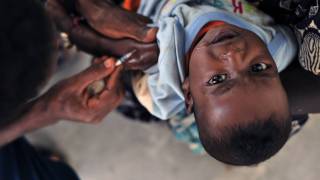Vaccinations Save Lives Everywhere

According to new modeling research, vaccinations against 10 major pathogens substantially impact public health in low-income and middle-income countries (LMICs).
Published in The Lancet on January 30, 2021, this study estimated that from 2000 to 2019, vaccinations prevented 37 million fatalities. Most of this impact is estimated to be among children younger than five years, most notably from measles vaccinations.
These results demonstrated that between 2000 and 2019, there was an increase in the average number of vaccines received per child, both for existing vaccines such as measles and for new vaccines such as rotavirus.
And this estimate by 16 independent research groups modeling the impact of childhood vaccination programs in 98 LMICs could increase to 69 million fatalities for the period 2000-2030.
The study assessed the impact of vaccination programs against ten pathogens: hepatitis B (HepB), Haemophilus influenzae type b (Hib), human papillomavirus (HPV), Japanese encephalitis (JE), measles, Neisseria meningitidis serogroup A (MenA), Streptococcus pneumoniae, rotavirus, rubella virus, and yellow fever virus (YF).
Dr. Caroline Trotter from the University of Cambridge UK, and a co-author on the study, said in a press statement, "There has been a much-needed investment in childhood vaccination programs in low-income and middle-income countries (LMICs), and this has led to an increase in the number of children vaccinated.”
“To inform future investment and ensure it continues, we need to evaluate the impact of these programs on public health. Our modeling has provided robust evidence on the effectiveness of vaccination programs in LMICs and indicated what might be lost if current vaccination programs are not sustained."
The study used two methods to assess impact to provide both a cross-sectional (yearly) and longer-term (lifetime) view of impact. The first method evaluated the difference in the number of deaths between the vaccination and no vaccination scenarios for each year and then totaled these annual results.
The second method assessed the long-term impact of vaccination by summarising the impact over the lifetime for groups of people born in the same year between 2000 and 2030 and then calculated the difference between vaccination and no vaccination scenarios.
This approach allowed for the inclusion of vaccination impact later in life, particularly relevant for diseases such as hepatitis B or HPV, where there is a long delay between infection and severe outcomes. Most of the impact of hepatitis B vaccination will be seen after 2030, whilst HPV impact will be seen after 2040.
Considering impact per year, the study estimates that from 2000 to 2030, vaccination will have prevented 69 million deaths from the ten diseases, 37 million of which were averted between 2000 and 2019. Vaccinations against measles had the most significant impact, preventing 56 million deaths between 2000 and 2030.
In terms of the impact of vaccination over the lifetime of people born between 2000 and 2030, the study estimated that vaccination would prevent 120 million deaths, of which 65 million are in children younger than five. Fifty-eight million deaths would be controlled by measles vaccines and 38 million by hepatitis B vaccines.
Considering those born in 2019, the study estimated that increases in vaccine coverage and introductions of additional vaccines resulted in a 72% reduction in lifetime mortality caused by the ten pathogens.
By taking this 2019 birth cohort and using UN World Population Prospects demographic estimates, the study estimated that mortality in children under five in the 98 countries would be 45% higher in the absence of vaccination against the ten pathogens.
The study also examined each vaccine's relative impact and demonstrated that measles, Hib, and pneumococcal conjugate vaccines (PCVs) have the largest impact on deaths of children under five.
Vaccines against HPV, hepatitis B, and yellow fever have the largest impact per person vaccinated over a lifetime.
Corresponding author, Professor Neil Ferguson from Imperial College London, UK, said: "Our study signifies the huge public health benefits that can be achieved from vaccination programs in low-income and middle-income countries.”
“By projecting up until 2030 in these 98 countries, we have provided insight on where investments in vaccine coverage should be directed to achieve further gains, for example, increasing HPV coverage in girls and pneumococcal conjugate vaccines coverage in children under five will have the most impact according to our modeling."
These researchers reported the level of uncertainty from data on disease burden and the structural assumptions of the different models. Still, they could not evaluate uncertainty in demographic estimates and estimates of past and future vaccine coverage.
In a related commentary published by The Lancet, this study underestimates vaccination impact because it includes only ten of the vaccines commonly used in routine childhood immunization programs.
Pertussis vaccination was not included and could impact pediatric mortality more than some of the other vaccines included in this analysis. Although variably used in children around the globe, the seasonal influenza vaccine was not included and would reduce severe disease and potentially mortality if used more broadly.
The study also excluded most vaccines against epidemic-prone and pandemic-prone diseases, such as cholera, Ebola virus, and typhoid, potentially saving many lives.
This study was funded by the Vaccine Alliance and The Bill and Melinda Gates Foundation. Researchers from Imperial College London conducted it, London School of Hygiene & Tropical Medicine, National University of Singapore, Public Health England, Laval University, Johns Hopkins University, Colorado State University, The Pennsylvania State University, Lafayette College, Kaiser Permanente, University of Cambridge, University of Notre Dame, Dublin City University, Harvard University, Oxford University, University of Southampton, Conservatoire national des arts et metiers, University of Hong Kong and the Center for Disease Analysis Foundation.
No researcher disclosed industry conflicts of interest.
PrecisionVaccinations publishes research-based vaccine news.
Our Trust Standards: Medical Advisory Committee
























